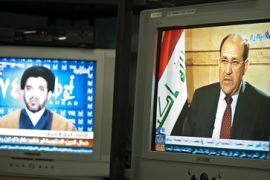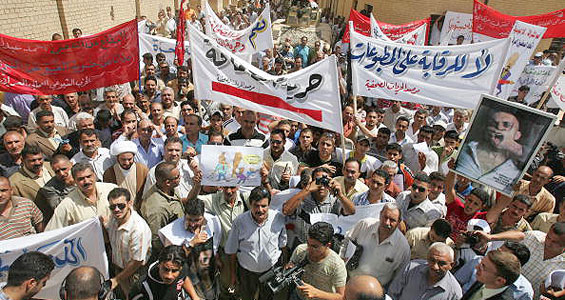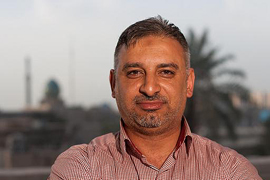Iraqi media faces serious hurdles
Seven years after regime change, Iraqi media struggles to define itself.

 |
| Iraqi journalists regularly hold protests calling for greater freedom of speech [GALLO/GETTY] |
Iraqi media has in recent days been airing back-to-back political advertisements, breaking news and all the latest updates and interviews from the campaign trail as nearly 19 million Iraqis prepare to vote on March 7.
It is a flood of information that would have likely remained suppressed just seven years ago under Saddam Hussein’s government, when harsh rules and fear of official reprimand determined what went to print or on air.
| special report |
 |
Now that they have been guaranteed the rights to freedom of expression and press by the constitution, the Iraqi media market has arguably become unrivalled elsewhere in the region.
Keep reading
list of 4 itemsInside the pressures facing Quebec’s billion-dollar maple syrup industry
‘Accepted in both [worlds]’: Indonesia’s Chinese Muslims prepare for Eid
Photos: Mexico, US, Canada mesmerised by rare total solar eclipse
“The past ten years in Iraq have been marked by drastic changes in the press,” Rawnaq Qassim, a reporter for the Arabic-language Free Iraq radio station, says on the sidelines of a major media event.
“We have witnessed radical, distinct changes and developments,” she says. “Now we are running electronic newspapers, huge satellite TV channels, and news agencies, which have an enormous influence on Iraqi public opinion.”
Before the US-led invasion of Iraq in 2003, local media coverage was “directed toward one party and for one leader,” Ahmed Rushdi, another Iraqi journalist, says.
Dozens of TV and radio stations now grace the Iraqi airwaves, and many more print publications pepper Iraqi news stands.
Biased media
 |
| Qassim says there have been radical changes in Iraq’s media since 2003 [Chatriwala] |
Some are commercially-backed, like al-Sharqiyah – launched in 2004 as “Iraq’s first privately-owned satellite channel” – and al-Sumaria TV.
Others, like Al-Baghdadiya, Forat and Afaq, are backed by major political blocs. And then there’s Al-Iraqiya, and its sister newspaper Al-Sabah, which are said to be state-run media.
“We expected so many things to be more open after 2003, and [it] has happened,” Rushdi, who is also head of the Iraqi Experts House, a media consultancy group, says.
“But now we have a serious problem – that the Iraqi media doesn’t engage, really, at the humanitarian, popular levels.”
“It is always [only] concerned with the political process,” he says.
Flagrant bias
As a result of the prominent political and government funding lavished on Iraqi media outlets, the industry here has produced mixed standards of journalism at best, and sometimes, even flagrant bias.
“If we are talking about bias, definitely you have a biased media,” Rushdi says, “because you already have a media directed, financed by [political] parties and maybe by the government.
“You know Iraqiya [for example,] is financed by the government, so it always [sides] with [Prime Minister Nouri] al-Maliki and so on.”
Rawnaq agrees, saying mainstream Iraqi voters have not seen their concerns highlighted in day-to-day coverage.
But she does not fault journalists for their reluctance to cover a certain type of story; she says Iraqi media tend to come under intimidation from all sides.
“Journalists, voters and most entities are facing huge pressure … we have politically powerful and influential parties, we have parties which oppose the political process, the rival political entities and even the election candidates,” she says.
Government restrictions
 |
| Roushdi says Iraqi media has not unshackled itself from biased reporting [Chatriwala] |
In the run-up to the March 7 parliamentary vote, the Iraqi Communications and Media Commission (CMC) attempted to impose new restrictions on media outlets to minimise what it considered calls to sectarianism by some broadcasters.
Included in the new rules, announced last February, were requirements that all media members register with the CMC, and pledge not to incite violence or sectarianism.
However, the CMC’s stipulations backfired as many prominent journalists accused the official body of seeking to control – and suppress – free speech.
What actions the CMC takes against broadcasters for their coverage on the eve of elections is difficult to determine at this point.
Nevertheless, Iraqis remain hopeful for the future of their media, Rushdi says.
“The Iraqis have a characteristic feature – they are always looking for success, success … [through] competition,” he says.
And that competition, he hopes, will help the average citizen approach “a good media – a good, accessible media for normal [Iraqis]”.